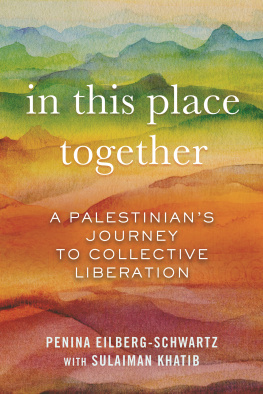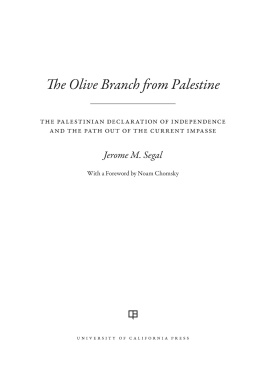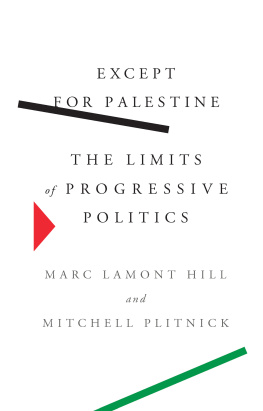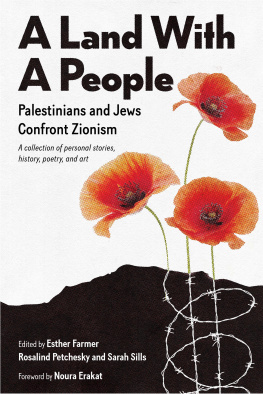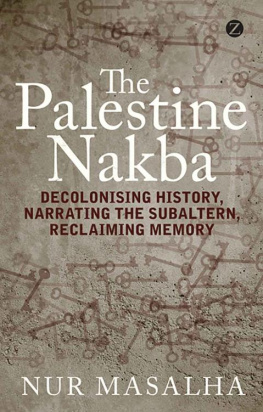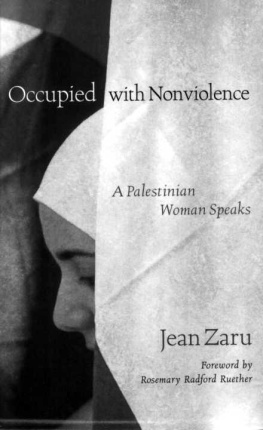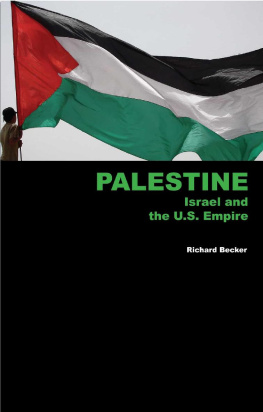Contents
Guide


Imagination is a secret companion who helps you correct typos in the book of the universe.
MAHMOUD DARWISH
The Land is a witness.
SHELLEY ELKAYAM
Meet them at the door laughing, and invite them in.
RUMI

A NOTE ON TRANSLITERATION
F or the Arabic transliteration, weve tried to use spellings that would allow non-Arabic speakers to approximate proper pronunciation of Palestinian dialect (i.e., fellah over fallah). We often favored the most common transliteration of words or names over those in line with a more consistent approach (i.e., Jneid instead of Junayd). Occasionally we chose a transliteration in favor of a friends preferred spelling of their name over the more common one (i.e., Aljafari instead of al-Jafari). And when an apostrophe appears at the end of a word, it indicates an ah soundso that, for example, Bir al-Sab sounds something like Beer al Saba. Though this is the case for the word tatbi (normalization), we used tatbia to help non-Arabic speakers recall the approximate pronunciation of this frequently used word.
For the Hebrew, we used ch for chet, and an apostrophe when separating two vowels that should be pronounced distinctly. We used kh for khaf, in part because this letter in Hebrew seems to map best onto the Arabic letter kha. We tried to balance consistency with use of the most common transliterations. Occasionally, we favored the more common transliteration over the most consistent one (i.e., Mizrahi instead of Mizrachi). Other times, we chose an inconsistent transliteration to help non-Hebrew speakers approximate proper pronunciation (i.e., Khevron instead of Chevron).
A NOTE FROM PENIA
B efore a crowd of Israeli Jews at a peace demonstrationin the same square where an Israeli man, certain he was right, shot Yitzhak RabinSulaiman Khatib stood on a stage. It was 2014, the war in Gaza not yet over. In Sderot, and sometimes in Tel Aviv, Israelis were ducking for cover. In Gaza, the death count was rising. That summer would see the deaths of approximately 70 Israelis, more than 2,200 Palestinians.
Looking down at a piece of paper, holding a microphone, Sulaiman wore a shirt that read Combatants for Peace. On his chest, two silhouettes threw their weapons behind them, as if recklessly. From the stage, Sulaiman began to speak to the crowd in his Arabic-accented Hebrew. It was a rare moment of solemnity for him, his words slow and deliberate.
My name is Sulaiman Khatib. Ive come from Ramallah.... We, Israelis and Palestinians, call on both sides to act in courage and wisdom, to immediately stop the war in Gazaand to start a serious dialogue. He spoke the Hebrew words that had taken on their own life and rhythm from frequent use. EIN pitaRON tsavaI lsichsOOCH shelanu. It meant what it always had: There is no military solution for our conflict.
When he stepped offstage, his phone began to ring. It was his friend Raed, calling from the Palestinian town of Yatta.
I saw you on Al Jazeera live!
Wallah, really?
Sulaiman was surprised. Combatants for Peace received mostly international or progressive Israeli press. Palestinian TV didnt often cover their actions. When it did, Sulaiman was sometimes called a traitor to his people; an asfur: the Arabic word for bird that, for many Palestinians, meant a spy for the Israelis. Someone who, among other things, normalized the occupation, practiced tatbia.
For a moment, Sulaiman felt a little afraid to go home to Ramallah. It only takes one stupid person, he thought. But by this time, hed grown accustomed to feeling fear and meeting it or sensing it and burying it. It wasnt always clear which acts of imagination and erasure were needed to build a new story from an old one.
T wo years later, a bit of wind blows as Sulaiman drives me down a West Bank road. The sky is darkening as we approach a famous junction near a number of Jewish settlements. Young Israeli soldiers stand at four corners, guns on their shoulders. As we drive by, Sulaimans shoulders inch toward his ears.
Sulaiman Khatibor Souli, as many know himis a Palestinian peacemaker from a village northeast of al-Quds, the Palestinian name for Jerusalem. He is cofounder and codirector of a binational nonviolent movement called Combatants for Peace, created by Israeli and Palestinian ex-fighters and ex-prisoners. He is a person whos been through much, who seems able to lightly hold burdens that would bring others to the ground.
Soon after we pass the soldiers, Souli turns to me and smiles. My jaw is clenched, not yet ready to let go. Ajaki, he says, laughing out his favorite word. Its a play off of Arabic slang from the streets of al-Quds, a word that moves between meanings, from You get it? to a nod of agreement. But the way Souli repeats itlike a song, or a punch lineit seems to mean nothing at all, or too much to name. His hair bounces over his eyes. When I first met him, it was shaved close to his head.
We are headed somewhere, but were not sure where. Its something Souli likes to do sometimes: get in the car at night and drive, without any destination, without any sense of what will come next. In this way, Soulis driving seems like a kind of dreaming, a thing he does often. Its linked to his way of existing firmly in reality while somehow escaping it entirely, living somewhere else, somewhere others cant quite find him.
Where he is now, in reality, its been almost fifty years since Israel took over East Jerusalem, the West Bank, and Gaza; over ten years since Israel withdrew settlers from Gaza, but kept control of its borders and so much else. Souli is not sure how many years its been since he acquired his nickname. Hes not sure how many years its been since he was only Sulaiman.
For years now, Soulis fans have told him to write his story. Its so cinematic, they say and touch his shoulder while he smokes.
They think Im a visionary, he explained to me once, grinning.
People do think this, Ive seen it, and its because of what happened after one big bang of a moment many years ago, when at the age of fourteen and five months, Sulaiman stabbed an Israeli and was sentenced to fifteen years in jail. The length of his life until then.
Some people talk about him as if he were a prophet because, when he was released from jail over ten years later, he went searching for a way to participate in joint nonviolent activism and reconciliation with Israelis. Among many other things, he worked alongside a handful of Israelis to create Combatants for Peace, resisting the occupation and modeling a shared, peaceful future. Because of this, some people read his life as a textbook for transformation. They want it written.
Why not have someone write the book in Arabic? Id asked him at the beginning.
Palestinians know this story, he said, waving his hand at a nonexistent fly. Palestinians know that zaatar is a religion, that land is a religion. They know what the olive trees, figs, and pomegranates mean to us.

